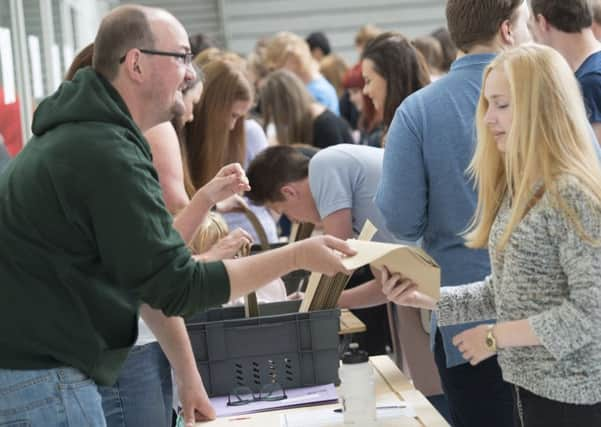Jayne Dowle: Good schooling should not think one size fits all


The simple solution would be for her to follow her brother to the academy where he has been supported throughout his journey to Year 10. This being education, nothing is simple.
I firmly believe that any decision made about schooling should have the child’s best interests at heart. I’m blessed with two children, a girl and a boy, who are very different in their educational approach and abilities. This makes the task doubly difficult.
Advertisement
Hide AdAdvertisement
Hide AdPut simply, Lizzie is a clever girl. Not supernaturally clever, but bright, enquiring and scarily well-organised. When she shows me her maths homework, I am in awe of the neat columns and annotated workings-out. She’s also independent and pretty feisty.
My deepest wish is for her to go to a school where her natural abilities and characteristics will be nurtured, not stifled and stamped out. A wise headteacher once told me that you should never make a decision about your child’s education based on your own experience. It is difficult though, when the personal memories of being bullied for being bright in a rough comprehensive are still too painful to recall.
At the academy open evening, I listened to the headteacher talk about the GCSE options that will be open to his pupils. In essence, once the teaching staff and the timetable are in place, this is straightforward. What is more difficult to put in place is a school culture where aspiration is encouraged and individuals are educated in an atmosphere where no-one is derided for wanting to learn.
This is a particular problem in this region. A couple of years ago, a report by Ofsted regional director, Nick Hudson, lamented the “poverty of expectation and poverty of aspiration” which dogs our schools. In Barnsley, where I live, actual educational attainment at GCSE level is gradually improving. However, these deep-seated problems will take some turning around.
Advertisement
Hide AdAdvertisement
Hide AdToo many youngsters are still growing up in homes where education is not held in high regard, or even derided. In the classroom, this translates into unteachable children. Confused and afraid, these children take their frustrations out on their class-mates. Able and eager-to-learn pupils are at particular risk.
Ask any teacher in secondary education what the biggest problem they face is, and they will say “discipline”. I don’t want to throw my little Lizzie into the lion’s den. I just want to be assured that she is safe in her studies and that her horizons can be stretched as far as they will go.
I think Lizzie would eventually like to go to university; at the moment her career plans veer between actress, lawyer and looking after dogs. Whether she does or she not, I would like her to get the chance to visit higher education institutions – not when she is halfway through her A-levels, but in a couple of years time when she is ready to start making serious decisions about her future.
I’d also like her to listen to and be inspired by all the possibilities the world might offer. At the open evening, I asked the teachers about links with the wider community in Barnsley. Do experts, professionals and business leaders come in and talk to the children, for example?
Advertisement
Hide AdAdvertisement
Hide AdWe’ve heard a lot from successive governments about the crucial role which such mentors can play in inspiring and informing young people. Yet how many schools in the state sector can boast a full programme of such events? At best, provision is patchy.
I’d like to urge all those in charge of running our secondary schools to lift their heads up from the league tables for just a moment and think about who they can get to come into school to speak. One teacher at the open evening mentioned getting a speaker in from a local law firm. This is encouraging, but the remit needs to be as wide as possible.
What about focussing on practical skills? Why not get a builder, an electrician, an IT specialist or a gardener to come and tell young people how to get a foothold in such a career? So many see a job but have no idea of the steps necessary to end up doing it themselves.
As we wandered around the school, it struck us that for all that successive Education Secretaries have talked about the need to encourage more young people to take up vocational trades, there is still much work to do in laying the foundations. All too often, “a modern apprenticeship” is the last resort for a teenager who simply can’t think what else to do.
Advertisement
Hide AdAdvertisement
Hide AdWouldn’t it be better if imaginations could be caught earlier on? A good school should find a way to run taster workshops run by local professionals.
A good school should also never think that “one-size-fits-all”. It should consider the needs, abilities and ambitions of every single child. I sincerely hope I can find one to do this for our Lizzie.